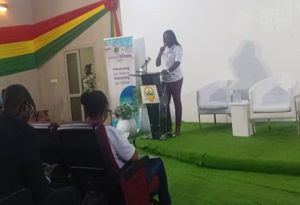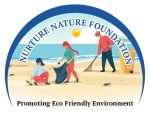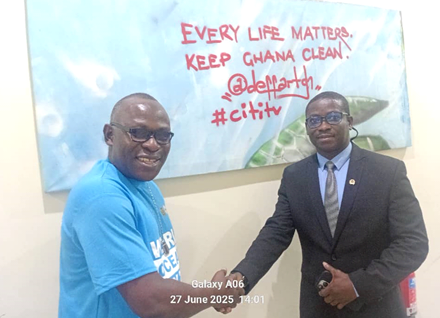Nurture Nature Foundation (NNF) reaffirmed its unwavering commitment to environmental protection during a vibrant observance of World Oceans Day 2025, held in Accra.
Organised by the Environmental Protection Agency (EPA), the programme brought together environmental advocates, academic experts, maritime professionals, civil society leaders and students under one roof to champion the urgent cause of marine conservation and plastic pollution reduction.
During the event, Executive Director of Nurture Nature Foundation, Peter Asiedu, held talks with key facilitators and stakeholders including Commander Philip Odoi-Narh of the Ghana Navy, highlighting the NGO’s expanding footprint in sustainability partnerships across the country.

Held under the theme ‘Preserving Our Oceans, Protecting Our Future’, the event amplified national awareness on the importance of ocean health and shared responsibility to safeguard Ghana’s marine biodiversity for future generations.
Engaging the next generation through art
A standout moment of the programme was an art-based competition among four Senior High Schools – Nungua SHS, Holy Trinity SHS, St. Mary’s Girls SHS and La Presbyterian SHS – who creatively expressed ocean conservation messages through sculpture and visual arts.
The competition was more than just a display of artistic talent; it was a compelling public sensitisation tool. La Presbyterian SHS emerged victorious with an evocative installation titled ‘Let’s Keep the Oceans Blue, Not Black’.
The students repurposed discarded plastic bottles to craft a whale’s head, symbolising the destructive impact of plastic waste on marine life.
“This is exactly the kind of creative engagement we need. When young people are empowered to tell stories of the oceans, the message travels far,” said Adriana Naa Korkor Nelson, Acting Director of EPA-Ghana, who moderated the panel session.

Panel discussion
A lively panel discussion featured some of Ghana’s foremost voices in environmental and marine protection:
- F.K.E. Nunoo, Professor of Fisheries Sciences, University of Ghana
- Commander Philip Odoi-Narh, Ghana Navy
- Kofi Agbogah, Director, Hen Mpoano
The discussion tackled core issues including plastic pollution, overfishing, marine governance and the growing importance of Ghana’s Blue Economy.
“Our oceans are under siege, not by foreign invaders but by our own waste,” said Prof. Nunoo. “If we don’t act now, we risk not only losing biodiversity but alo undermining our food systems.”
He pointed out that Ghana’s marine protection footprint remains well below international standards.
“While we commend government’s efforts, protecting just 0.3% of our marine space is a far cry from the 30% global target. We must scale up our efforts – quickly and decisively.”
From a marine security perspective, Commander Philip Odoi-Narh emphasised the intricate link between land-based behaviour and ocean health.
“Whatever happens in the sea starts from the land and ends on the land,” he stated. “Plastic pollution, oil spills, illegal fishing – these all begin with human behaviour onshore. The sea is our boundary, our breadbasket and our responsibility.”
Mr. Kofi Agbogah, Director of Hen Mpoano, welcomed the designation of new Marine Protected Areas (MPAs) but cautioned that more is needed.
“The 700 square kilometres of protected marine space is a step in the right direction,” he said. “But it’s only 0.3% of the expected 30%. We need an aggressive and inclusive strategy to expand MPAs to protect marine life and sustain our coastal livelihoods.”
EPA CEO’s rallying call for change
Delivering a passionate keynote, Prof. Nana Ama Browne Klutse, CEO of EPA-Ghana, urged a national mindset shift toward ocean protection and responsible consumption.
“Plastic pollution is a national emergency,” she declared. “The ocean cannot be our dumping ground. It is our shared responsibility to ensure that marine life thrives – not just for biodiversity but also the food security of future generations.”
She encouraged collective action and policy enforcement, noting the EPA’s commitment to education campaigns, stakeholder partnerships and community mobilisation.
“We need everyone – from schools and churches to businesses and communities – to get involved. Let’s change how we consume, how we dispose and how we protect.”
Marine protection areas and legislation
Building on the day’s discussions, Minister for Fisheries and Aquaculture Development Emilia Arthur recently announced new efforts to prevent illegal encroachment on marine zones.
According to the ministry, 700 square kilometres of Ghana’s marine territory have now been designated as Marine Protected Areas; a major step forward in achieving Ghana’s ocean governance commitments. However, this figure currently covers only 0.3% of the total marine area recommended for conservation under international protocols.
“Encroachment of marine zones is a serious threat – not just to fish stocks, but also our sovereignty,” the minister said in a recent engagement. “The new MPAs are a bold step, but enforcement and community buy-in will be critical.”
Advocating sustainable solutions
At the heart of the Day’s proceedings was the strong presence and advocacy of Nurture Nature Foundation. The organisation, known for championing grassroots environmental action, used the platform to propose a bold policy measure.
“We are calling for enacting a Segregation of Waste at Source Law,” said Mr. Peter Asiedu, Executive Director of NNF. “Mitigating excessive ocean pollution begins with how we manage waste in our homes, markets and institutions. Segregation at source is not only sustainable – it’s economically empowering. We can create wealth from waste.”
Mr. Asiedu also commended the EPA and partner organisations for creating a platform where young people, scientists, security forces and civil society could align on a common vision for the oceans.
“We believe that education, empowerment and empathy are the tools we need to drive environmental change. Our oceans give us so much. It’s time we give back – by protecting them.”
World Oceans Day is observed annually on June 8 to promote sustainable use of ocean resources and raise awareness of the growing threats to marine ecosystems. The 2025 celebration in Accra stood out not only for its thoughtful discussions and youth involvement but also catalysing policy conversations and civil society action toward a cleaner, safer and more resilient ocean future.

